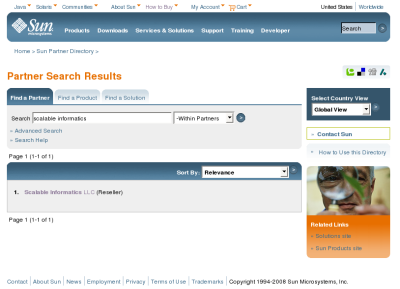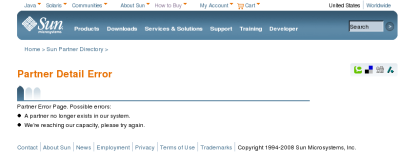Fan-boy-ism and HPC
By joe
- 8 minutes read - 1561 wordsI have had discussions in email groups recently where I encountered some interesting phenomenon. Call it corporate cheerleading, or “fanboy” behavior. The signatures of this phenomenon are
* Tendency to repeat marketing material as inherited from a higher diety
* Tendency to attack other points of view not in line with their corporate-centric one
* Tendency to attack posters of such views as being biased, and suggesting that competitive products that might be offered by the poster, but not mentioned or alluded to by the poster somehow constitute bashing.
This is a sad. No one owns all the mindshare in HPC, no one has all the best products, and their products are not shipped from Mt. Olympus.
Moreover, they (all products) have bugs, misfeatures, targets, design foci, etc. Denying this, or implying that it is not the case, or spinning to counter serious concerns due to acquisition of relevant technologies does not help the cause. Rather it hurts it, and has a strong re-inforcing subtext. I am a natural born skeptic. I need to be convinced. Maybe it is a personal failing, I don’t know. We have been challenged multiple times over our benchmark numbers for JackRabbit, and in all cases have responded carefully with a well thought out and well reasoned response. We have been challenged on other aspects, and again, we provide a careful response. We do this, as we respect our customers and our potential customers. We don’t shovel marketing drivel at high rates of speed (I once told a boss of mine that he was especially good at this, and it may have had an impact upon my career at that organization. Luckily he was/is still my friend, and he took it in the humorous way it was intended). We have raised questions in public that our customers have raised with us in private. We don’t know the answers, and simply asked or inferred based upon our understandings at the time. Sadly, I was attacked in two different fora over asking such questions, over the last week. From people I otherwise respect on a technical level. They apparantly dropped their technical hats, donned marketing hats, and decided that anyone who dares to point out that there are other file systems that might be worth paying attention to then Lustre or zfs, probably has a screw loose. Or is biased as they aren’t selling Lustre or zfs or the raison d'??tre for zfs, the product most directly competitive with JackRabbit. Apparantly, pointing out that people have had problems with zfs, and that a simple google of them finds them, means that I am biased against zfs and the product most directly competitive with JackRabbit. Hmmm. Newsflash. Zfs isn’t perfect, isn’t bug free. We are VERY interested in it. And I don’t mean this from a competitive point of view. It looks very nice relative to some of its feature set, and we can’t wait for it to be available under Linux. Of course the CDDL is incompatible with GPL2 (go figure), so until Sun changes their licensing of it, it will not find its way into the Linux kernel. So we have to use it in user space via fuse, and this provides something of a performance hit. This port isn’t ready for prime time yet, though we would like it to be at some point. The FreeBSD port looks to be “almost” ready, with a few showstoppers (from what I read on the mailing list) mostly overcome. We could run FreeBSD on JackRabbit. So it is an option, albeit non-optimal. We could always run Solaris (OpenSolaris) on JackRabbit. We simply don’t see this as the right direction in the market for storage. We are looking very closely at Nexentastor, it does look like the right model for specific types of storage appliances that require Solaris. So zfs is effectively limited to Solaris, eventually (soon) FreeBSD, and after the MacOSX port, MacOSX. As Simon had pointed out here a while ago, zfs is open source. However, open source is not homogenous, and you have to pay very close attention to licensing. Note that IBM and other large players don’t seem to have a problem releasing their open source stuff as GPL2, which is in part why it gets included in the kernel and other projects. Sun appears to favor its CDDL which effectively excludes its inclusion in the kernel. One might tend towards tin-foil hat conspiricy theories with regards to that, but that would be incorrect in our estimation. The issue is that with the CDDL, Sun has effective control over where the code goes. Someone could rewrite the zfs via clean room techniques, but there is the little matter of Sun’s zfs patents. So, while it is CDDL, and CDDL is open source, unfortunately, without Sun’s blessing, the likelihood of it showing up in Linux via a relicense or a rewrite without using fuse, is next to nil. Now why on earth would Sun give a blessing to have a direct competitor to what it believes to be its crown jewel, incorporate its IP within it? Hence the CDDL is a subtle, but effective method to prevent distribution to competitive OSes. MacOSX is in no danger of taking out Solaris on servers … it is restricted to Apple servers. FreeBSD is not likely to oust Solaris either, but for other reasons. So for Sun to bless these is a no-brainer. None of this requires a tin-foil hat. Sun is doing what any competitive technology vendor is doing. It is maintaining control over its IP. It has figured out how to do this while simultaneously being able to call it open source. This is fine, this is Sun’s prerogative. Its' their property, they can decide what to do with it. No complaints here on that front. It is not even disingenuous to call it open source, as the CDDL is an OSS license. Its just not compatible with GPLv2. Second, Lustre having been bought by Sun is now focusing a great deal of effort on the Lustre/zfs integration. With the aforementioned problems with zfs on Linux (licensing, not technical), will this work be used within the Linux Lustre implementation? Basically I had pointed out that zfs was not bug free, and simply pointed to the Lustre/zfs integration, and that our customers have asked us to find out whether or not this meant that Lustre was defocusing upon Linux (its main installed base) in order to focus upon a way to provide clustered storage on the product most directly competitive with JackRabbit. It is a perfectly valid question, a reasonable one at that. When I asked about what was happening in MySQL as a result of the acquisition, I got some interesting responses. The meme that emerged from the blogosphere appeared to coagulate around the aquisition being a good way for Sun to save MySQL (which was doing a good job of alienating its customer base, though I suspect this was due more to its massive growth and need to carve out a defensible niche than anything else). As a user of MySQL and Postgresql, I didn’t have any serious issues or dependencies upon it that couldn’t be fixed. A non-issue to us for the most part, DragonFly will talk to any DB backend. When I pointed out the zfs bits and asked about the Lustre/zfs integration, I got “your biased” on mailing lists. When I mentioned GlusterFS as another cluster file system (hey, my customers want to know about all of them, whats good, whats not, whats coming up, whats declining), I got criticized for bringing up a non-Lustre file system. When I pointed out that some users had run into MDS bottleneck issues, we got a negative backlash response. A user kindly pointed out that he didn’t see this with his use case, and that is good. Pointing out real problems is not FUD. Pointing out concerns over future roadmaps for recently acquired technologies is not FUD. Acquisition and business process changes all increase risk for users of that technology. If Sun were to make a business decision that said, everything on Linux is second or third tier on all software targets, well that is their right, but we would want to know. It would impact what solutions we present our customers. Sadly, what our detractors, and those who accuse us of being biased, may not be aware of, is that we are Sun resellers, and happy to be so. We sold one of the first v20z clusters, before Sun got serious about clusters. We have been trying to work with them on other opportunities. We are even using Sun parts/products in an RFP that we will be responding to this friday. Well, on the internet, it is often said that one should not let facts get in the way of a good bit of flamage. Sadly, we seem to be on the receiving end of that flamage. Ahhh well, as long as they spell the company name right … :) Update Hmmm, maybe the tin-foil hats are needed. We are listed in the partner database,
[

](/images/SI-in-sun-reseller.png)
but when you click on the link …
[

](/images/SI-listing-error.png)
hmmmmmmmmmmmmm (looks about for his tin-foil hat) Gee … is someone telling us something? I know this was operational yesterday, as a customer contacted us through this mechanism. Heh.